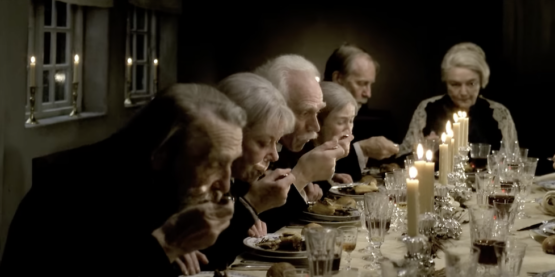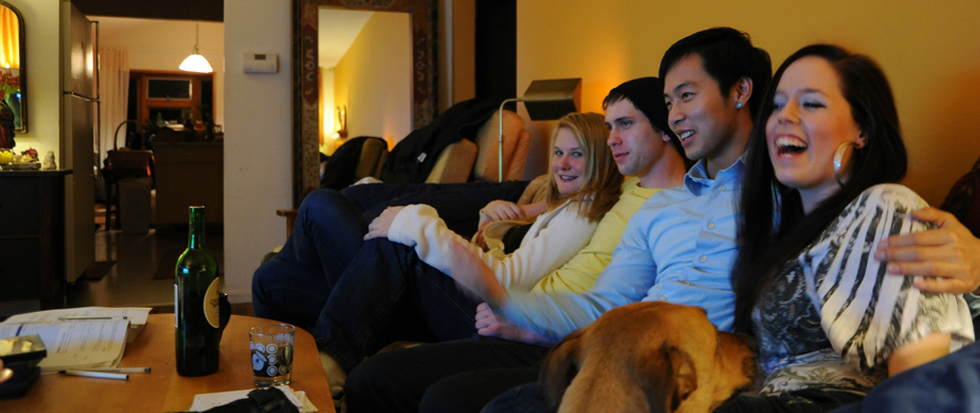
The Secret Ingredient is Love
Whenever I visit my mom, she insists on making my favorite childhood meal: meatloaf, mashed potatoes, and creamed corn. She doesn’t have to do that, I tell her, and every time she responds, “I know I don’t have to do it.” Similarly, whenever I’m sick, my wife whips up a soup with kale, sausage, and potatoes that I just love. We might not always make such full, nourishing meals for ourselves, but we wouldn’t think twice about doing it for the people we love.
Movies commit a lot of food sins. In movies, food is usually a shorthand to show power imbalances between characters (Jules Winnfield eating the Big Kahuna Burger in Pulp Fiction), to characterize greed (Dennis Quaid’s truly abhorrent shrimp-eating scene in The Substance), or as a metaphor for the ouroboros of capitalism and consumerism (basically anything involving zombies or cannibalism). The missing ingredient here is the one any good meal has: love. Two films put that love to screen and, in doing so, demonstrate how cooking for others is a beautiful thing worthy of exploration in the stories we tell.
The eponymous feast in Babette’s Feast (1987) doesn’t actually happen until the last forty-five minutes. Everything up to that point tells the story of a provincial Jutland village and how Babette came to be there. Civil unrest in Paris killed her husband and her son, and now she works for room and board for two elderly sisters, the daughters of the village’s late pastor. The village itself is an odd one—geriatric and religiously austere, the villagers all seem bitter. They’ve lied, cheated each other, cheated on each other, and bicker constantly about all this during church.
Babette wins 10,000 francs from a lottery ticket, her only possession after fleeing Paris fourteen years earlier. She pleads with the sisters to allow her to cook the village a “real French dinner” in honor of their late father’s centenary.

Babette brings in a whole list of exotic ingredients. The sisters and villagers clutch their pearls as they come in – notably, a sea turtle and no small amount of French wine. They vow to eat the food out of Christian politeness, but to not say a single word about it.
The feast has a surprise guest in Lorens, a now-famous Swedish general who had, decades earlier, come to the village and fallen into unrequited love with one of the sisters. Unlike the villagers, he takes loud, vocal joy in the food being served: turtle soup, blinis Demidoff, cailles en sarcophage. The chef who’d invented this last dish, Lorens says, turned food into “a love affair that made no distinction between bodily appetite and spiritual appetite.” An early scene in the film shows the sisters teaching Babette to make øllebrød, a Danish ale-and-bread soup. If that doesn’t sound appetizing, it’s because it wasn’t meant to be. It’s meant to be filling. What Babette is serving is more than that: it nourishes and fills the spirit just as much as it nourishes and fills the body.
Despite themselves, the villagers eventually give in. They eat eagerly and joyfully, finally smiling at one another. They apologize and make amends for the hurt they’ve caused over the years. They are, for once, content and happy. They leave the dinner drunk, full, their souls fulfilled. Taking each other’s hands, they dance and sing of eternal life. As it turns out, all they needed to bury the hatchet was a good meal.
The Taste of Things (2023) takes a different approach. Here, food is a way of communicating romantic love rather than bringing people together. We follow the love story between a famous gourmand, Dodin Bouffant (Benoît Magimel), and his personal cook, Eugénie (Juliette Binoche). Dodin and Eugénie use food to reaffirm their love for one another, painstakingly constructing elaborate meals. Several times Dodin has proposed marriage to Eugénie, who kindly turns him down.
Eventually, Eugénie falls ill, and Dodin nurses her back to health. This culminates in him arranging a fripé, a papery-looking dessert, into a flower in full bloom, an engagement ring hidden inside. This dessert says everything that words failed to communicate to Eugénie about how he feels. It isn’t just about filling her body and soul, it’s a declaration of love.

How could she say no to that?
One transition from the film is forever etched into my mind: Hidden within the fripé, along with the engagement ring, is a poached pear. We’ve seen him handpick this pear from a jar of other, less beautiful, pears. It lies on the plate, gorgeously lit, sensual, curvy. The shot fades and we transition to Eugénie’s naked body in bed, positioned exactly as the pear.
This subtle visual cue tells us exactly what Dodin and Eugénie’s relationship is like: love and food are indistinguishable.
The final shots of the film flash back to a conversation between the two of them following their marriage. They’re seated at a table in the kitchen – where else? – and Eugénie asks her husband if she is his cook or his wife. For most, the answer would be clear: you say she’s your wife! When Dodin tells her that she is his cook, though, it’s meant as an affirmation, a promise to spend what little time they have left together in service to one another.
During Babette’s feast, one of the villagers quotes their late pastor: “Dear brothers and sisters, the only things we may take with us from our life on earth are those we have given away.” All the time spent in the kitchen making food for those we love is one of those things we give away, and one of the things we get to take with us. Food is an impossibly ephemeral thing that gets consumed and then is gone. So, next time you’re in the kitchen, don’t be afraid to give a little more of yourself to what you’re making; it’s all so delicious, and dinner will be over far too soon.
———
Jimmy Hollenbeck is a writer and professor living in Ohio and he likes food so much he usually eats it three times a day. His favorite thing to cook is chicken korma.




